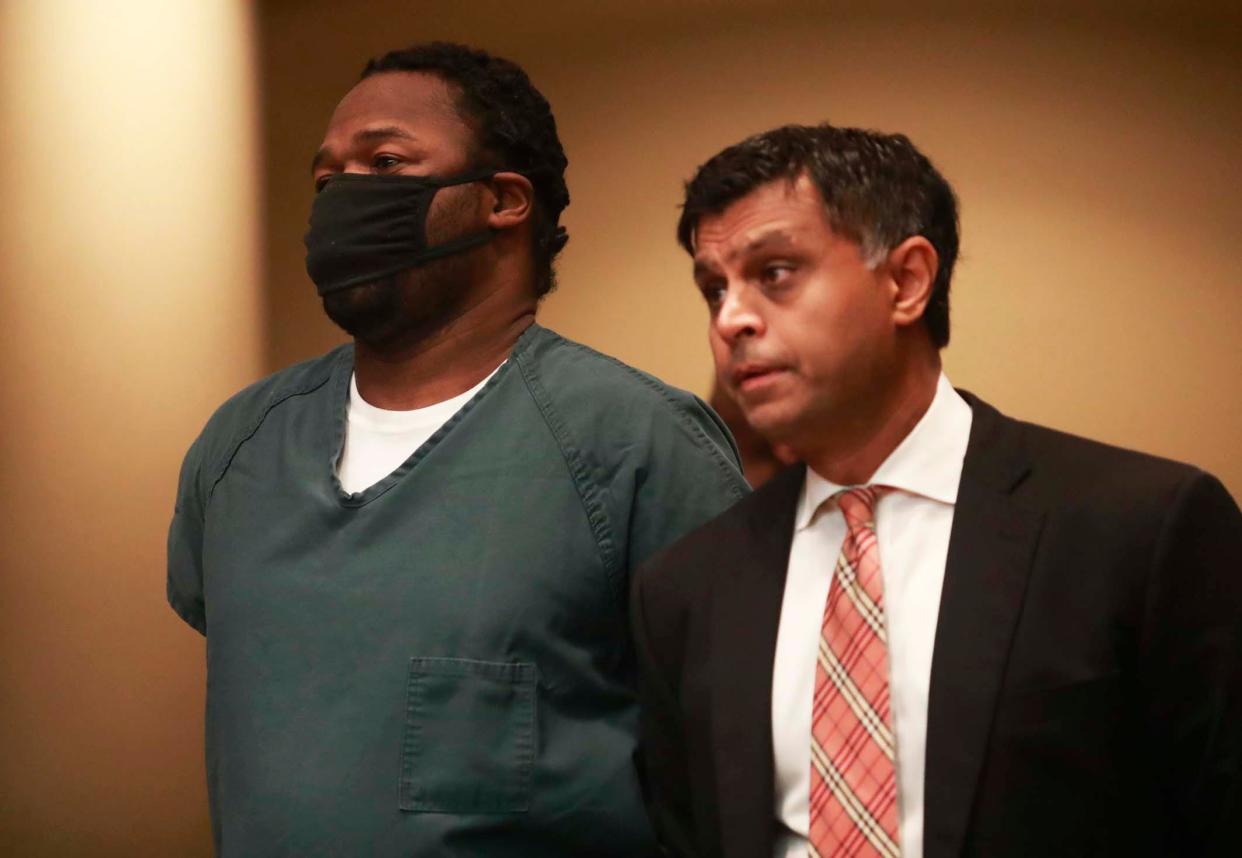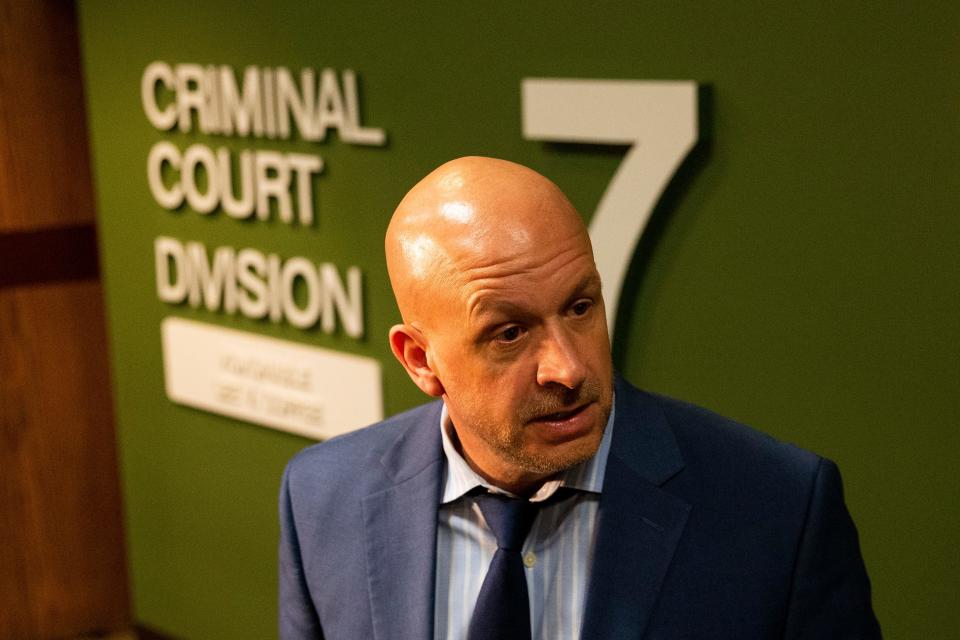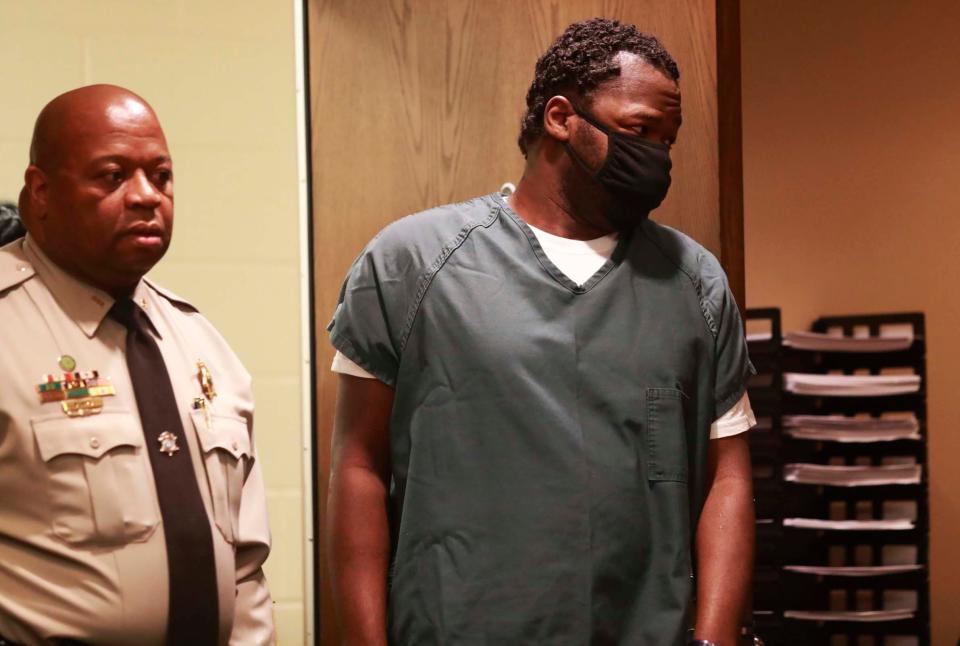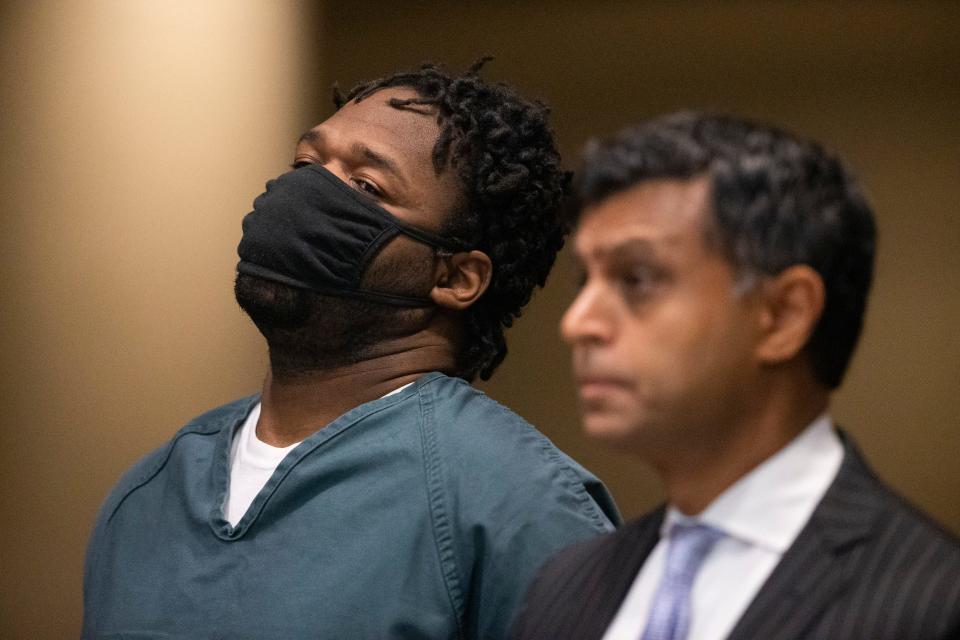Jury finds Cleotha Abston guilty of rape. Crime occurred a year before Eliza Fletcher killing

After about seven hours of deliberation over the course of two days, a Shelby County jury on Friday delivered a guilty verdict against Cleotha Abston in an alleged 2021 rape.
The trial spanned three days, with jury selection on Monday and arguments going from Tuesday to Thursday afternoon. The jury, during that time, was sequestered.
Abston is also accused of kidnapping and killing Memphis school teacher Eliza Fletcher two years ago. That case is expected to go to trial later this year.
There was not much physical evidence presented during the rape trial, and no witnesses to the alleged incident were called to testify aside from the woman alleging the rape.
"We are extremely satisfied by the verdict," Shelby County Deputy District Attorney Paul Hagerman told media outside the courtroom after Friday's verdict. "We fought long and hard this week. Y'all saw it, but it took a lot of courage throughout this thing, and took a lot of courage this week for Alicia [Franklin] to come into the courtroom and tell her truth, show so much bravery, face all those questions and accusations and everything else. But the jury, in the end, saw the truth and did what was right."
The jury began deliberating just after 1 p.m. Thursday, and did not return a verdict until after 11 a.m. Friday. The jury did, however, pop into the courtroom just before 3 p.m. Thursday to view body camera footage from interviews during that were shown earlier in the trial.
Abston was indicted in the Franklin case for three different counts — aggravated rape, especially aggravated kidnapping and being a convicted felon in possession of a firearm. The jury found him guilty of aggravated rape and convicted felon in possession of a handgun, and guilty of the lesser charge of aggravated kidnapping.
Hagerman, who prosecuted the case, during the trial attempted to appeal to the jury's sentiment toward the victim, pointing to aspects of her tale that were not flattering to herself as a reason for believing her testimony, while Abston's defense attorney, Juni Ganguli, attempted to portray the incident as attempted prostitution.
According to Ganguli, Alicia Franklin, the woman who pursued rape charges against Abston, met him on a dating app and had intended to charge Abston money for "her time," which Franklin later said included sex. Ganguli went on to say that, after Abston refused to pay Franklin as much as she wanted, she reported the incident as a rape.

Ganguli pointed to a lack of physical injuries on Franklin as indicative of sex between Franklin and Abston being consensual.
Both the prosecution and defense agreed that money was intended to be exchanged for sex, but Hagerman, and Franklin herself, alleged that the rape happened at gunpoint — with Franklin saying she felt the gun barrel "on her back" the whole time it happened.
What did Alicia Franklin say happened?
Franklin, who testified Tuesday afternoon, told the court that she was expecting $200, but never discussed payment with Abston. She said she had planned to talk to him about it when they met up, but he immediately pulled a gun on her.
The two met on a dating app called Plenty of Fish, and planned to go to dinner at Olive Garden before going back to Abston's apartment to "chill," Franklin said. Abston had told Franklin to come to his apartment and wait for him to shower and get ready to go out. When Franklin arrived, she said the apartment appeared vacant, with no furniture, and Abston immediately put a gun to her throat.
"She has to make split-second decisions as to if she lives or dies," Hagerman said during his opening statement. "He throws her in the back seat of a white Dodge Charger. He says he's going to kill her. She pleads with him, she begs him to stop. But she lets him rape her to survive."
'A scandal of epic proportions': Appeal heard in lawsuit over 12K untested Memphis rape kits
Evidence from the Fletcher abduction and murder case was displayed in court Tuesday morning as well. A FBI agent, whom the court ordered not be named or photographed due to the agent's work as an undercover operative, recalled arresting Abston after surveilling the apartment complex in the Fletcher case.
A Memphis Police Department officer later confirmed a pistol — a CZ 9 millimeter — was found in Abston's car at the time he was arrested. Franklin said that pistol seemed "like the same one" used during the alleged rape.
In the months since Abston was charged, Franklin has received criminal harassment and assault charges of her own. In court Tuesday, she said she was not offered a deal in that case to testify against Abston.

Wednesday's arguments featured testimony from Gwendolyn Brown, Abston's then-girlfriend, along with testimony from two police officers, an MPD lieutenant, a former nurse practitioner with the Rape Crisis Center and a Tennessee Bureau of Investigation DNA specialist.
Much of Brown's testimony centered on the use of the car, and Abston's disappearance. Brown also told the court that she did not know if Abston owned a gun, saying that, if he had one, "he hid it from us."
Abston lived in an apartment with Brown, and her three children, until his arrest in September 2022, which was connected to the Fletcher case and not Franklin's. According to Brown's testimony, the vacant apartment where the rape took place was next door to the apartment they lived in. At the time of the alleged rape, Brown said her kids were at home, "likely in their rooms."
This was a point of emphasis for Ganguli, who asked if the apartment complex had "thin walls." Brown said they did, and that her apartment shared a wall with the vacant one. Brown said her children did not say they heard "screaming or someone getting thrown around" after the incident was alleged to have taken place.
MPD sex crimes investigator testifies
Testimony from the sex crimes investigator, MPD Lt. Shameka Love, included clips of her body camera from interviewing Franklin at the Rape Crisis Center and a brief investigation of the vacant apartment complex. When investigators got to that apartment, they did not appear to find any physical evidence, with Love specifically saying she was looking for the shirt used to allegedly cover Franklin's face.
Ganguli focused his questioning of Love on why she did not keep Franklin's cell phone in evidence, or take pictures of text messages between Franklin and Abston at the very least. Love said she gave Franklin her phone since she said she needed it for work and her personal life.
"She was a victim," Love said. "She is not required to give us her phone like a suspect is. I didn't want to re-victimize her."
At one point, Ganguli asked Love if she could have taken pictures of the texts. Love said, "yes," but she did not take pictures of the messages. At one point during the Rape Crisis Center interview with Franklin, Love appears to hold the phone up to the body camera in an attempt to document some of the texts, but the image was not clear.
Franklin did give Love a working phone number for Abston, and Love made several attempts to speak with him. She said she was only able to get Abston — or someone answering Abston's phone — on the phone once, and she said he told her, "You don't got nothing on me," and hung up the phone.

Ganguli later asked Love why she did not document that conversation in a report. Love responded by saying she was "not sure" why she would not document that in supplemental reports because that call "was important" to the investigation and the case.
What was the physical, DNA evidence in the case?
Diary Prater, a retired forensic nurse practitioner, also testified as an expert about the rape kit that was taken from Franklin the night she said she was raped. Prater, who worked for 14 years with the Rape Crisis Center and said she had conducted over 200 exams, was the person who did Franklin's exam.
In her report, Prater noted that there did not appear to be any physical injuries to Franklin — no bruising, scratches, abrasions, cuts, redness or apparent damage to her genitals — but added that most rape victims, in her experience, do not have physical injuries.
More: Lawyer for Cleotha Abston, charged in Eliza Fletcher case, wants Nashville jurors
TBI Special Agent Christie Smith also testified as a DNA expert. Smith was the person to process Franklin's rape kit at the TBI crime lab in Jackson and said that there was a "very high" probability that the DNA came from Abston, saying the semen sample was "consistent" with his DNA that was obtained after his arrest.
During closing arguments, Ganguli told the jury this case was "not a case about rape or kidnapping," but that it was about "prostitution, it's about prices and it's about lies."
"Rape is a crime of opportunity," Ganguli said during Thursday's closing arguments. "Who would leave a trail of communication on an app before committing a rape? You wouldn't want to give your cell phone number or your address."
Ganguli also tried to discredit Franklin's testimony, calling it "bizarre" and "inconsistent," and push doubt into the jury's mind by noting the lack of physical evidence and eyewitnesses.
"All you have is what she told you," he said.
Hagerman, during his closing arguments, said that Ganguli had provided no proof to his allegations, saying none of the testimony supported them.
"Those were all [Ganguli's] questions, not evidence or testimony," Hagerman said.
As a final note to the jury, Hagerman held an evidence bag that contained the pants that Franklin was wearing the night of the rape. Briefly, during her testimony, she had said that she had peed her pants when Abston put a gun to her neck.
Raising the bag before the jury, Hagerman said this was proof that something had scared and traumatized Franklin enough to spur a physical reaction.
"For Cleotha Abston, this rape lasted minutes," Hagerman said to the jury in closing. "For Alicia Franklin, it has never stopped. I need you to end it today."
Lucas Finton is a criminal justice reporter with The Commercial Appeal. He can be reached at [email protected], or (901)208-3922, and followed on X, formerly known as Twitter, @LucasFinton.
This article originally appeared on Memphis Commercial Appeal: Memphis jury finds Cleotha Abston guilty in 2021 rape of Alicia Franklin
